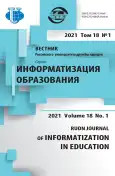Анализ эффективности освоения будущими учителями информатики ресурсов Московской электронной школы на базе площадок производственной практики
- Авторы: Садыкова А.Р.1, Левченко И.В.1, Карташова Л.И.1
-
Учреждения:
- Московский городской педагогический университет
- Выпуск: Том 18, № 1 (2021)
- Страницы: 45-61
- Раздел: ПРЕПОДАВАНИЕ ИНФОРМАТИКИ
- URL: https://journal-vniispk.ru/2312-8631/article/view/321206
- DOI: https://doi.org/10.22363/2312-8631-2021-18-1-45-61
- ID: 321206
Цитировать
Полный текст
Аннотация
Проблема и цель. Анализируются площадки производственной (педагогической) практики на базе московских школ в контексте эффективного освоения будущими учителями информатики ресурсов Московской электронной школы. Целью является выявление корреляции цифрового следа, полученного в результате разработки индекса сетевой активности школ на основе данных о действиях учителей и учащихся в средах электронного обучения и определения соответствующих этому индексу образовательных организаций, а также методической активности школ города Москвы - баз производственной (педагогической) практики будущих учителей информатики. Методология. Использовались анализ нормативных документов и базы московских школ, на площадках которых осуществляется производственная (педагогическая) практика студентов Московского городского педагогического университета, обучающихся по направлению «Информатика», рефлексия содержания полученного знания, поиск критериев отбора базовых школ для проведения производственной (педагогической) практики будущих учителей информатики, локальный педагогический эксперимент. Результаты. Установлено, что активность школ в разработке и использовании образовательных ресурсов Московской электронной школы не является обязательным условием сотрудничества именно с ними. В то же время владение будущими учителями-предметниками информационными технологиями, в том числе технологией работы с ресурсами Московской электронной школы, является неотъемлемой частью профессиональной компетенции современного педагога и особенно учителя информатики. Заключение. Предложены основополагающие критерии выбора площадок для производственных практик будущих учителей информатики, в частности студентов Московского городского педагогического университета. Сформулированные критерии отбора базовых школ для проведения производственной (педагогической) практики студентов университета позволяют успешно решать поставленные перед этим видом учебной деятельности задачи, достигать намеченных целей и формировать профессионально-педагогические компетенции.
Об авторах
Альбина Рифовна Садыкова
Московский городской педагогический университет
Автор, ответственный за переписку.
Email: albsad2008@yandex.ru
доктор педагогических наук, доцент, начальник департамента информатики, управления и технологий
Российская Федерация, 127521, Москва, ул. Шереметьевская, д. 28Ирина Витальевна Левченко
Московский городской педагогический университет
Email: ira-lev@yandex.ru
доктор педагогических наук, профессор, профессор департамента информатики, управления и технологий
Российская Федерация, 127521, Москва, ул. Шереметьевская, д. 28Людмила Игоревна Карташова
Московский городской педагогический университет
Email: ludmila_kart@mail.ru
кандидат педагогических наук, доцент, доцент департамента информатики, управления и технологий
Российская Федерация, 127521, Москва, ул. Шереметьевская, д. 28Список литературы
- Abdurazakov MM, Aziyeva JH, Romanov PYu, Sadykova AR. Teachers IT competence structure and content in the field of cloud computing. The European Proceedings of Social & Behavioural Sciences. 2017:1–8.
- Pavlova AE. Particularities of distance learning in view of the theory of generations. Vestnik of Moscow City University. Series: Informatics and Informatization of Education. 2012;1(23):65–70. (In Russ.)
- Tamoshina ND. Internet technologies in school education. Vestnik of Moscow City University. Series: Informatics and Informatization of Education. 2006;2(7):158–159. (In Russ.)
- Kartashova LI. The periods of formation and development of cognitive interests of learners with use of information technologies. Bulletin of People’s Friendship University of Russia. Series: Informatization in Education. 2009;(3):55–60. (In Russ.)
- Levchenko IV. Methodical training of the teacher to use in lessons of information technology. Vestnik of Moscow City University. Series: Informatics and Informatization of Education. 2007;1(8):62–66. (In Russ.)
- Levchenko IV. Professional and pedagogical activity of teachers of informatics in the conditions of fundamentalization of education. Vestnik of Moscow City University. Series: Informatics and Informatization of Education. 2008;3(13):39–46. (In Russ.)
- Levchenko IV, Kartashova LI. Training of teachers to form students' cognitive interests by means of information and communication technologies. Bulletin of Peoples’ Friendship University of Russia. Series: Informatization in Education. 2006;(1):20–23. (In Russ.)
- Levchenko IV. Methodical training of teachers of informatics in the conditions of informatization of higher professional education. Vestnik of Moscow City University. Series: Informatics and Informatization of Education. 2007;2(10):38–45. (In Russ.)
- Levchenko IV, Sadykova AR. Approaches to solving the problem of search of scenarios of lessons on informatics for basic school in the Moscow E-School library. RUDN Journal of Informatization in Education. 2019;16(3):231–242. (In Russ.)
- Sadykova AR. Evristicheskij komponent v professional'noj deyatel'nosti prepodavatelya: teoriya, metodika, praktika [Heuristic component in the professional activity of a teacher: theory, methodology, practice]. Moscow; 2010. (In Russ.)
- Korzhuev AV, Babaskin VS, Sadykova AR. Reflexion as a strategy in the process of life-long pedagogical education. Higher education in Russia. 2013;(7):77–80. (In Russ.)
- Korzhuev AV, Sadykova AR. Pedagogicheskij poisk: vremya peremen [Pedagogical search: time of changes]. Moscow; 2018. (In Russ.)
- Patarakin ED, Vachkova SN. Network analysis of collective actions on digital educational objects. Vestnik of Moscow City University. Series: Pedagogy and Psychology. 2019;4(50):101–112. (In Russ.)
- Patarakin E, Burov V, Yarmakhov B. computational pedagogy: thinking, participation, reflection. Digital Turn in Schools – Research, Policy, Practice. Lecture Notes in Educational Technology. 2019:123–137. https://doi.org/10.1007/978-981-13-7361-9_9
- Kupriyanov RB, Lavrenova EV, Patarakin ED, Yarmakhov BB. A recommendation system for building school teachers’ multidisciplinary skills. European Proceedings of Social and Behavioural Sciences. 2020;95:1212–1221.
Дополнительные файлы









